The Lift - Chris Moran and Gavin Fernie-Jones
What does the proposed new gondola in Bozel say about the future of the ski industry, and our attitudes to climate change? I asked two friends and locals to exchange views - here's how it went down...

I’m just back from a week in France’s Three Valleys, where I had a really brilliant time catching up with old friends and generally re-acquainting myself with one of my favourite corners of the world, a whopping 26 years after my first winter season in Meribel.
Anecdotally, it was also fascinating on the ‘Wow! Look how much THIS place has changed!’ level.
A few cases in point: the locals saying that the days of the season beginning in late November or early December, something we planned our late 90s seasons around, were long gone.
Or the number of oligarch super-pads lining the pistes on the run down into Courchevel 1650.
Or the fact that we (OK, ill-advisedly) did a classic itinerary run off the top of the Olympic Express, and found ourselves doing the type of bush-whacking that is usually a feature of April, rather than February.
Personal anecdotes and observations such as this aren’t exactly trustworthy as data, of course.
But they do reflect the increasingly widespread feeling that irreversible change is coming to this part of the world, whether we realise it or now.
If you’ve listened to my recent conversation with Re-Action Collective’s Gavin Fernie-Jones (above), who lives in the valley town of Bozel, you’ll recall that this was a big theme of our conversation.
That ski resorts, reliant as their economies are on climate-dependent tourism, are the proverbial canary-in-the-coal-mine when it comes to the climate issue, and the approaches and attitudes we have when it comes to tackling it.
At the moment, as with the wider conversation around the climate crisis, this debate tends to devolve to one fairly binary question:
Do we continue to put our faith in existing economies, and try and ‘business’ our way out of it (which is a key theme of my forthcoming podcast documentary series The Announcement)?
Or do we use this situation as an opportunity to explore different ways of living?
All of which explains why one looming local issue in particular caught my attention during my visit: the proposed gondola that will apparently link the valley town of Bozel with Courchevel, in time for the 2030 Olympics, which are rumoured to be heading for this part of France.
For some locals, the gondola sounds like a no-brainer. It’ll help with the transition to summer tourism, cut traffic and ease pollution.
For others, the impact will be negative. It will mean more tourism, will threaten the community that currently makes Bozel such a unique destination in the Three Valleys, and is a throwback to the type of ‘growth at all costs’ thinking we’ll at some point need to leave behind.
In other words, as with similar debates taking place in La Grave and Salt Lake City, here we have a perfect metaphor for the wider climate crisis, and the type of issues communities around the world, it is contended, will increasingly have to grapple with.
That’s why, to explore these themes and ideas, I asked Gavin Fernie-Jones and Chris Moran (who I interviewed for the show at the end of 2022), two friends who live in Bozel and who are on opposite sides of the debate, to exchange views on the proposed lift, and expand upon what they think it will mean to the community they both hold so dear, and the future of tourism in the French Alps.
Here’s how it went:
1. Gavin Fernie-Jones:
Dear Chris,
I have several reservations about the new ski lift project in Bozel that will link the village to the Three Valleys ski area.
My main worry is how this lift will affect our tight-knit community.
The area thrives on tourism, which has been great for us. But I believe there's a limit to how much tourism can be of benefit. Just by looking up the mountain, we can see how rising prices and exclusivity can push out a whole community.
Right now, Bozel is in a good place.
We have locals of all ages and backgrounds, a bustling school, and a strong community that thrives all year round.
As we enter further into the climate crisis, the bets really are off as to how society copes and continues to function. I believe more than anything, we’ll need strong communities, and the support and help of those closer to home.
I fear that connecting Bozel to the resort with a ski lift will displace our community. House prices will shoot up - with the sale of some already on hold awaiting the anticipated rise brought about by the lift. Landlords will hike up rents or choose more lucrative rentals from holidaymakers. And some of the people that call our community home will be forced out.
I think we must consider if sacrificing our community for ski tourism, which will not last indefinitely, will truly be worth it in the long run.
Cheers,
Gav

2. Chris Moran:
Hey Gavin,
I hear you loud and clear on the house prices. It’s been a massive concern of mine all through my life and I’ve been a fan of Henry Georges’ elegant solutions to the problem using Land Value Taxes (and their sister policies of Citizens or Basic Income) since I heard about them in my 20s.
Without boring you, nor Matt, who’s heard me bang on about LVT for decades (Ed: this is true), it’s a centrist policy that essentially spreads the wealth created by infrastructure across the community that paid for it.
Not that I think it’ll ever happen in my lifetime, but I mention it in passing as I believe that house price inequality is a far, far wider problem than projects like the lift in Bozel.
But back to that subject: I’m a fan of the lift for several reasons. 1) I’d selfishly like to have a smaller commute to the hill. 2) It would undoubtedly remove an untold number of cubic kilometres of CO2 from the atmosphere over its lifetime by way of fewer cars driving up that damned hill. And 3) It’d add to Bozel’s growing summer destination status. I believe that road and mountain biking will step up as winter tourism changes, and having Bozel at the heart of a cycling trail network is far more appealing than the summer construction sites of Courchevel or Meribel.
But you’re right, it would mean change. I just think change is essential if the Three Valleys is gonna keep its place as one of the most desirable mountain destinations in the world. A status that probably most of us rely directly or indirectly on to make a living.
Cheers,
Chris
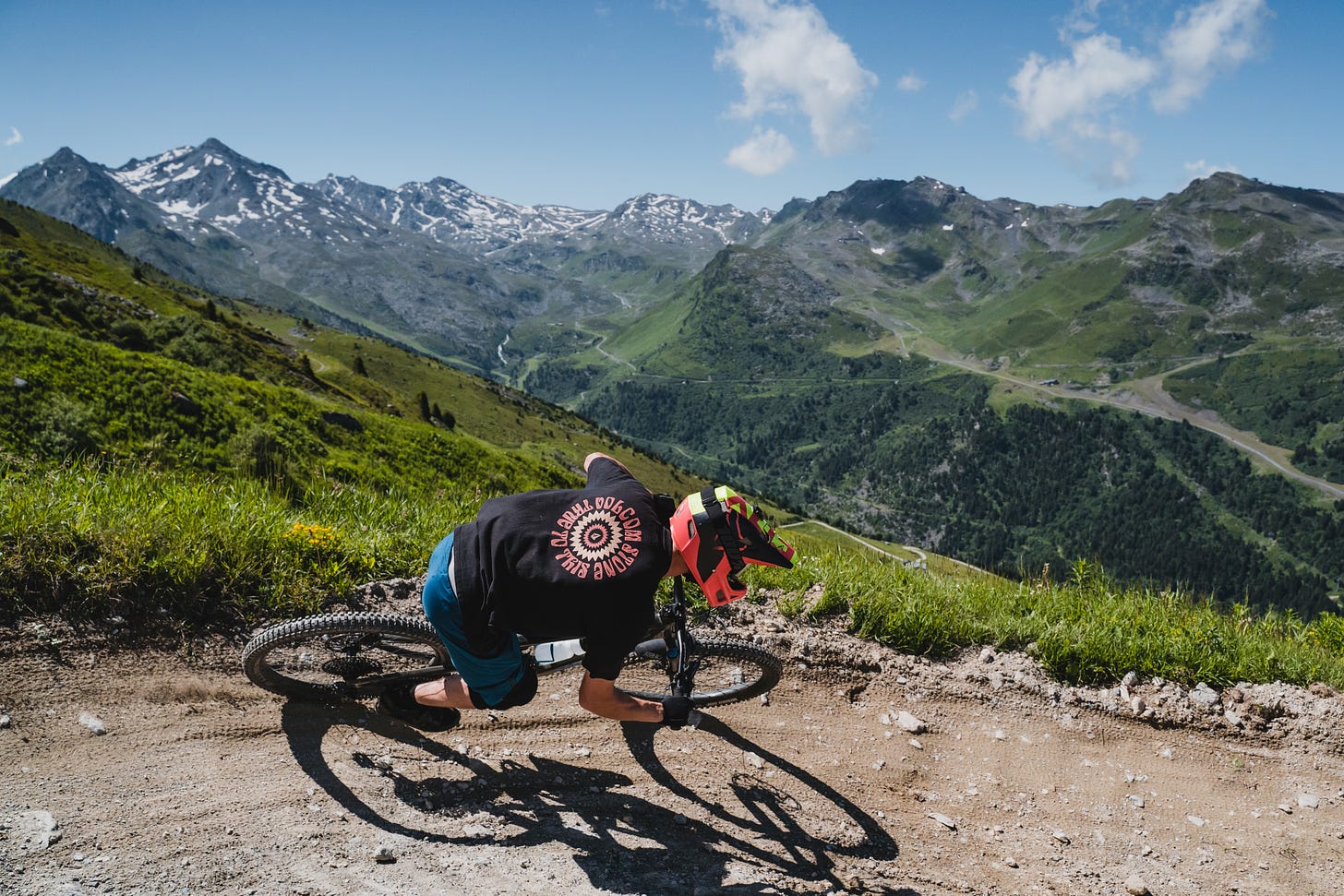
3. Gavin Fernie-Jones:
Hi Chris,
It’s clear that we both have the best interests of our beloved Bozel at heart. And obviously what this conversation is about is how Bozel faces the future in an ever-changing world, where we are witnessing rapid environmental changes at first hand.
When it comes to our valley’s traffic issues, I have my doubts that the lift will address this, or whether it is even designed to.
For example, the construction project for the lift includes 8 major zones, such as bridges, a hotel, parking, and the lift itself. Additionally, there is a rumour that an athletes' village for the 2030 Olympics will be built in Bozel. They’re also planning an 11,000 m2 destination hotel by the lake, on top of the current car park.
This all sounds like more, not less traffic, to me. But if reducing traffic IS one of the goals of this project why not expand the free bus service instead? This way, more residents and workers would benefit. The new lift will travel from A to B whereas the bus service runs to all levels in the ski resort. This could provide a more sustainable and inclusive transportation system for the community.
Either way, I’d like to see a study to determine how many cars could be removed by a more comprehensive bus service. For example, the bus service in the Auvergne-Rhône-Alpes as a region is in the process of being decarbonised with 50 coaches currently being retrofitted for hydrogen. With an excess of renewable energy locally, hydrogen is an obvious resource with which to decarbonise the public bus service. Maybe this could reduce road emissions more than the lift, without the huge outlay of upfront carbon emissions these huge construction projects will bring?
I also agree with your second point, that as our winters continue to change, Bozel will have to look towards summer to offset (sorry) the revenue we’ll lose as winters continue to shorten. I just remain unconvinced that road and mountain biking can meet this gap.
Recent studies highlight that biking cannot replace winter tourism. In 2021/2022 53.9 million skier days were sold across the French Alps. There just aren't enough downhill mountain bikers to keep the current lift systems open at the rate they currently run in the winter.
In fact the summer mountain biking currently doesn’t create enough revenue to service the lifts in the summer; they are subsidised by winter operations. That helps explain why the only other major lift that operates from the valley bottom in Brides-les-Bains only opens on a Sunday and Monday during the summer.
Due to the economics of running the lifts I think the mountain biking of the future will more likely be electric assisted and not lift assisted. Bozel could invest in building bike trails lower down the valley; we have the uphill tracks and roads to service a local trail centre.
Above all, when it comes to the future, I think Bozel should play to its strengths and not look up the mountain, something the new lift literally and metaphorically symbolises. Because I believe a continuation of the same story but with two wheels lacks imagination. It leaves us stuck. We need to work collectively to reimagine what comes next. The community and the fundamentals are here. I think Bozel should build on these strengths.
I do agree that change is essential but for me that doesn’t involve a repeat of what has gone before. Extending the lift system and constructing hotels is the story we have grown up with. It’s the story that says growth at all costs will fix all our problems. I just do not believe that is now the case, and I’d love to hear your take on this.
Cheers,
Gav

4. Chris Moran
Hey Gav,
I totally agree with you on many points. Not least that we both love Bozel and the area. I guess we both moved here to be part of the amazing community and also to use the incredible mountains and infrastructure that turned Courchevel from a farming community into the world’s most famous ski area from the 1930s onwards.
I have to disagree with you on some points though. It seems quite clear to me that having a lift from Bozel to Courchevel via St Bon would take out a huge amount of traffic from the Grand Carrey > Courchevel road. Bozel is home to many people who work on the mountain; lifties, instructors, restaurant staff, chalet owners and operators etc. And if all of those people commuted via a gondola instead of driving up, then that alone would be of huge benefit to the traffic problem. Add in the fact that the visiting tourists could park at Bozel and do the same then I can’t see any other outcome other than fewer cars on the road.
Of course during the construction there’d be a spike in activity - the bridges and other things you mentioned - but over the life of the lift that is a drop in the ocean. And in comparison to the ongoing construction in the resorts whether the lift is built or not: again it pales into insignificance.
Could an upgraded bus service solve the problem? I’m highly doubtful. There’s already an existing bus service. It’s busy, it stops frequently, and is just as vulnerable to traffic jams caused by transfer days, accidents when it snows, or other blockages. Add in bikes and - as the summer navette program shows - everything slows down even more. We have to remember that when it comes to holiday choices - and this is the industry that feeds the majority of the valley’s inhabitants - people want convenience above all else. Gondolas are a much more elegant solution to the problem of getting people to altitude. I do agree with you though that any navette service in the future should be electric.
On to the summer offering. Only Chamonix and Morzine/Les Gets have comparable winter and summer tourism numbers. Chamonix is an exception due to its climbing and walking history and being at the foot of Europe’s highest mountain, but Morzine and Les Gets are not so different to our nearby resorts. And Les Gets in particular has shown that with investment into cycling and a summer program, then revenues can balance out across the seasons. You are completely right in the sense that today the skiing subsidises the summer activities, but that can change.
Bourg St Maurice senses this too, and the cycling community there has worked in collaboration with the mairie (in fact they campaigned on behalf of one mayoral candidate) to have the funicular there open year round specifically to help push cycling as part of their tourism offering. Not only can I see Bozel pushing for a similar thing but I know that there are already connections happening in the cycling world within Bourg’s community, the relevant mairies and lift companies involved. The proposed gondola from Bozel would accelerate these plans.
As to your points about the future of bikes being more electric assisted, and the idea that Bozel could grow without looking up the mountain. This is perhaps the point I disagree with the most. E-bikes will certainly be part of the growth, but the basic starting point for mountain resorts and for mountain tourism in general, is that people want to be taken uphill, to then enjoy the ride down. E-bikes are amazing and the road bike network around the 3V is incredible, but the vast majority of bike riders cannot handle 2000m+ ascents, even with pedal assist. Yes there will be people who are happy to enjoy valley level activities - Bozel lake is amazing, and the hikes and via ferrata nearby are also great.
But Bozel’s economy is inextricably linked to getting people up the hill and allowing them to meander back to our beautiful town using gravity and smiles. If Bozel is to become more of a resort itself (and this seems to be the bottom line question here), then a lift will absolutely help with those plans.
Cheers,
Chris
5. Gavin Fernie-Jones
Alright Chris,
Mountain biking isn’t my sport so I’ll happily defer to your knowledge about what the majority of bike riders are looking for when they visit a resort.
In my last reply I challenged you about different ways of thinking.
Humans and all life on earth is in a tight spot. We can see the climate and biosphere collapsing around us, and we’re at a point in time where everything must change, including the human economic model of growth at all costs.
You mentioned convenience in your reply which is at the core of modern capitalism. We’ve grown up in a world where we can have everything we can dream of delivered the very next day. A world where we’ve been told to think of ourselves as consumers. This is now having a detrimental impact on society and the planet.
It’s not our fault. We’ve been conditioned to think like this from birth, by governments, advertising, and big money. The dominant story of our life has stated that our role is to consume, and that action alone will lead to an upwards trajectory for society.
I would argue that the consumer story is in collapse. We’re struggling to fund healthcare, pensions, schools, basic human needs and at the same time that consumer story adds fuel to the climate crisis.
Unfortunately for us a changing climate doesn’t take convenience into consideration. Human beings will have to make huge changes - inconvenient changes - if we’re to have a survivable planet.
At the minute we’re stuck thinking that the same old ideas will work - grow the lift system, swap skis for bikes, build hotels and athletes villages. We’re propping up the failing consumer story, and this is leading us to a dead end.
That’s why I think for any meaningful future we need a massive shift in thinking.
The change that I think is necessary is both systematic and broad, and it involves a changing of human habits. We can’t keep reaching for the same answers that have gone before.
That all maybe sounds a bit wild, when the original conversation was about a new ski lift but, I see Bozel as a microcosmic example of our wider problems.
What I’d be really interested to know is, at what level and over what timescale you think the climate crisis will affect our local ski resort, and also what levels of change you think society needs to make.
Do you believe we need the kind of change I’ve described or do you see it as an overreaction to the situation?
Cheers,
Gav

6. Chris Moran
Hey Gav,
So yes, we did start talking about the lift, and I agree with you in that really this discussion is far wider than that - it’s about what our core politics are. As mentioned with the house price discussion, I’m a Georgist at heart, and definitely on the left. But I’d also consider myself a pragmatist.
I think we’d both agree that our climate problems are caused by the burning of fossil fuels which have led to too much carbon dioxide in the atmosphere. Therefore, if we can reduce those emissions to zero - which is a question of moving from fossil fuels to renewable fuels and energy generation - then the problem is broadly fixed. This did happen with the ozone layer/CFC emissions problem of the 1980s. Plus it had the unintended consequence of weaning everyone off hairspray. An unexpected cherry on the cake, as it were.
I agree with you in that there are other problems with inequality. But these are socio-economic problems and in my view they are totally separate to the climate discussion. Broadly speaking, I’m kinda ok with capitalism. Sustainable growth, with manageable carbon output, must surely be the goal? Realpolitik and all that!
Case in point: I believe that the lift - powered by electricity made by the hydroelectric generators in Bozel and Planey - with help from the nuclear generators in the French national energy grid - would help in the reduction of fossil-fuel-burning cars going up the hill. To me this is a pragmatic way to solve one problem (less CO2), whilst simultaneously improving the local infrastructure and therefore the local economy. “Growth” as it were. Or to put it another way, this is a pragmatic solution that could actually work in the long term. If in ten years all the cars are battery, then hey, we still have a great lift and the road is less likely to jam up on transfer day. Win-win.
If we look at the “more buses” alternative (and I’m using this example as you’d mentioned it in an earlier reply), then I believe that the likely outcome would be that most people would ignore using the bus and continue to drive, and therefore the CO2 emissions wouldn’t change. And worse if tourism in Bozel grows - which is sure to do with the Olympics on the horizon - then CO2 emissions would actually go up. Neither of us want this.
A further alternative is to ask people to not use the mountains, or to use pedal or leg power to access the altitudes. In this scenario, I simply see tourism going elsewhere. Again, the net effect on CO2 emissions as far as the planet is concerned does not change. And at a micro level, Bozel’s boom in tourism (and the associated local gains in infrastructure and commerce) also disappears.
In summary, if we’re gonna replace current problems with workable solutions, then they also have to be improvements. Moving to battery cars for example is a good thing (again, less CO2). Asking people to stop driving is just not a viable proposition. People just won’t do it. They’ll just keep driving their old diesel cars. Which is the exact opposite of the desired outcome.
You asked about timescales and zooming out to the wider problems; here, I honestly think that necessity is gonna be the mother of invention. We’re close to solving a lot of our energy problems. The worse things get, I think the quicker actual solutions will appear. I would imagine they’ll include new as-yet-to-be-invented technologies as well as having to hold our noses and accept things like nuclear power stations. If we on the left get stuck endlessly proposing unworkable solutions then the right will keep winning elections. Again, the opposite of what we want.
Just directly in answer to your points, I don’t feel that consumerism is in collapse and nor that we’ll have to make inconvenient choices. I think that if we make wise choices in moving to renewables, and tweak the existing capitalist model to something more equitable, then we might be able to manage growth and give our kids and grandchildren the kind of really incredible opportunities that we’ve enjoyed during our lifetimes.
On a personal level, I love the One Tree at a Time store, and I know that you’re someone who loves to get involved in the community and wants to make a difference. I think we both want the same thing, I guess we just have a disagreement as to how to get there. Either way, it’s a genuine honour to know you and I’ve enjoyed this discussion enormously. And can I propose that we carry on the discussion this spring if we go splitboarding/ski touring in the Les Avals area?
Thanks again Gav, and see you soon!
Chris
What did you think of this exchange? Do they reflect your views on the climate crisis? How do you think we should approach the challenges ahead? Let me know:

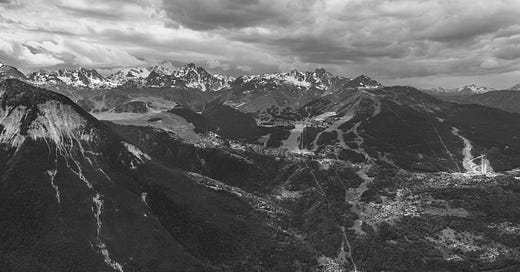


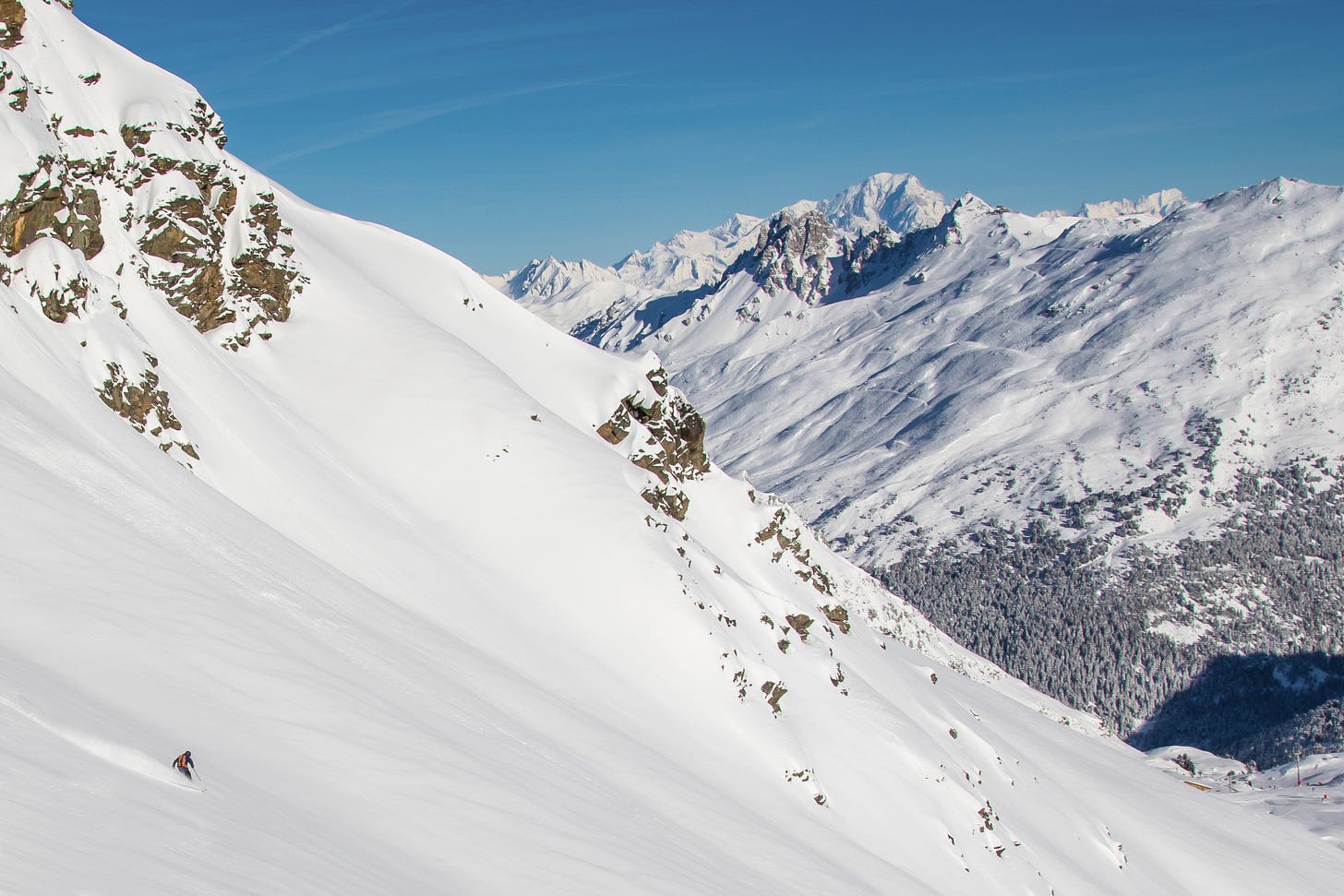

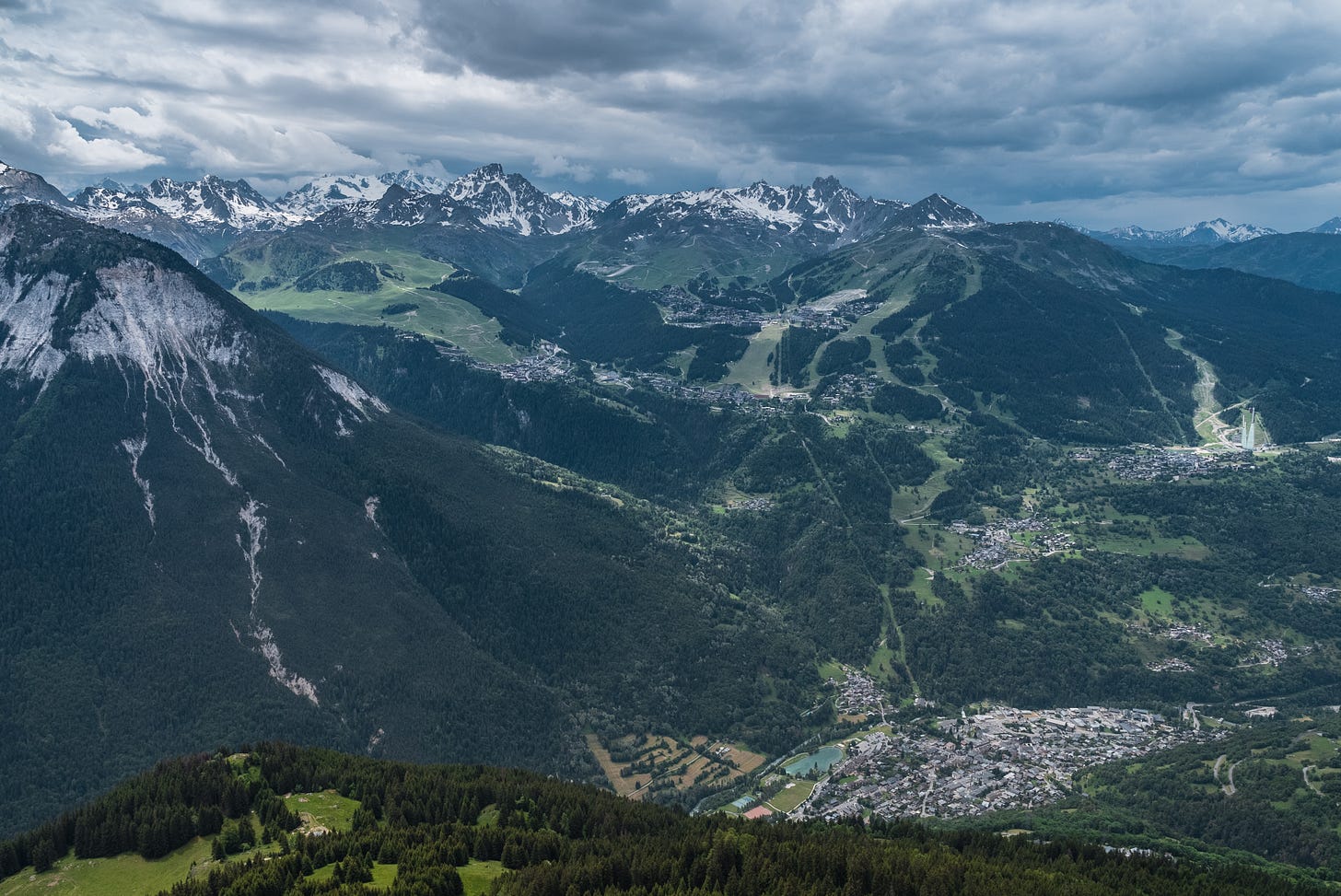

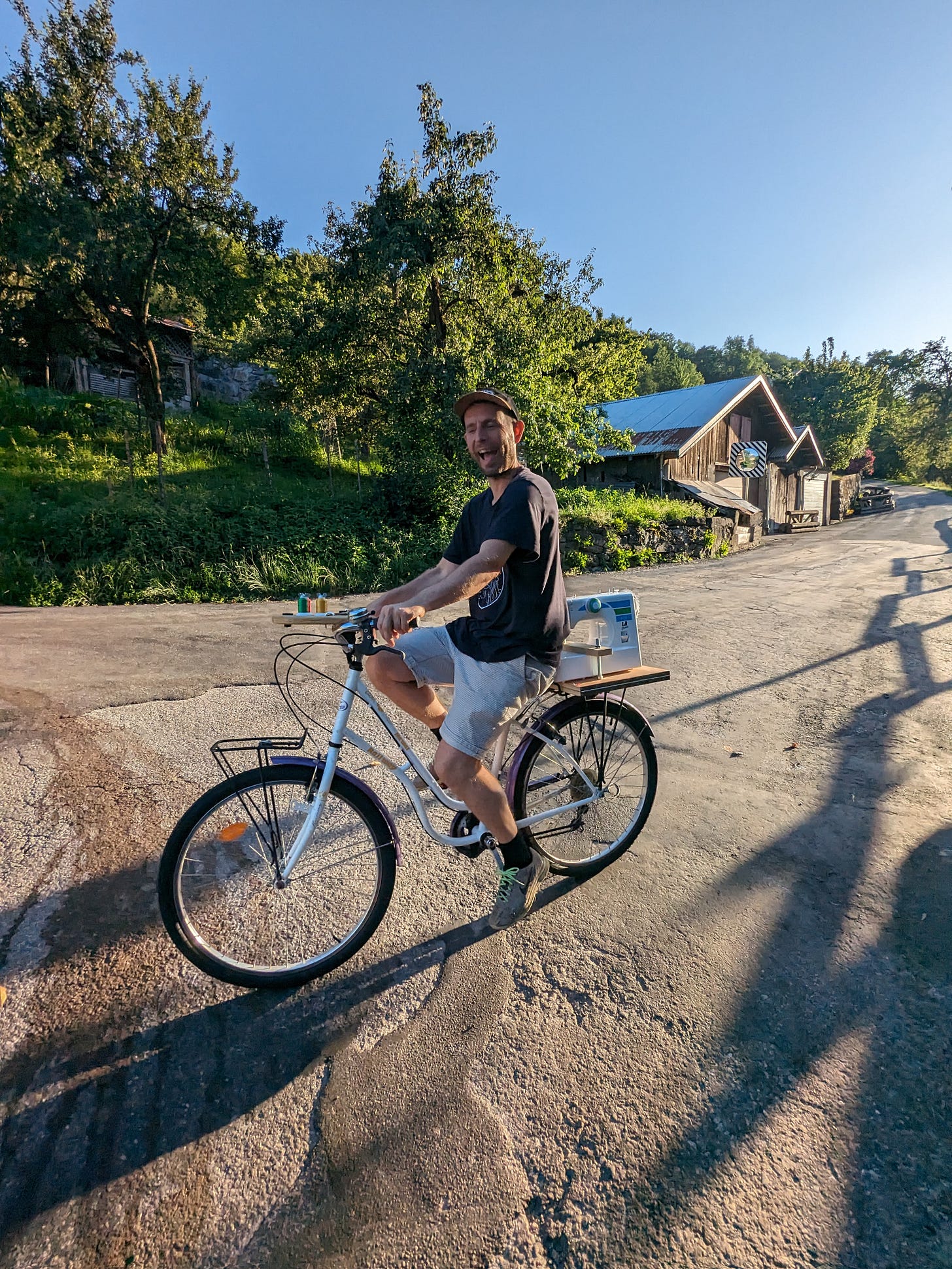

This is such a great format for this kind of discussion! I loved reading this exchange. I love the format, but I also love how the chat moves from the local to the global depending on the point each person is trying to make. Thanks for taking the time to give us this insight. One thing I wondered, and I might be really wrong about this, but neither Gav nor Chris seems French, which means you're migrants (from Britain?) who moved by choice. That's totally fine - I mean, I'm a White Australian so I've no ground to stand on in terms of being a migrant! - but neither of you talk about the changes your own migration already wrought on the town in the past, which means your own "baseline" for community is what you found there and what you moved for. The point being, you've already been part of the changes happening there.
The chat reminds me of the question Matt posed at the end of the podcast ep on Yulex (which I only listened to today, so that's why I remember) about whether intention matters in why we make change, and how we decide on which kinds of changes to make. This discussion shows a few sides of that - ensuring economic growth and preserving "community". Coming from a small town that is now a world famous beach destination, I grew up with a close view of the kinds of damage "growth" can bring so I'm not on the side of business [I'm never on the side of business] but I also know that people have a right to access the beautiful beaches of the area. These days, I live in a very, very urban city, and at a time when the importance of blue and green spaces for our health is being argued so strongly, well, why shouldn't people want to access that?
With all that in mind...
There can be so much certainty in an economic argument because we know the grounds on which we're building your case; business, baby! [insert dancing emoji] But when we fight for community, it's sometimes hard to really articulate what we want to preserve and why. Is "the environment" or "the community" enough? I mean, yes! But I guess what I'm thinking of is the debate about a cable car on kunanyi/Mt Wellington in Hobart, Tasmania. A key opposition there is that the mountain is an important cultural site for Indigenous Tasmanians, who are already super generous in letting residents and visitors go up the mountain when they don't really want us to. Constructing a cable car on that mountain would be great for lots of reasons (the road is hectic!), but since it's opposed by Traditional custodians on cultural grounds, then it seems like a terrible idea to build it. But that cultural argument is about caring for Country, and thus ancestors, and thus people, and thus animals and plants, and thus all future generations. People are part of environments.
Anyway, I'm not sure I'm offering any useful input here except to say that I think it was really interesting to read and I really appreciate the time these guys took to write these answers. And I'm sorry for banging on, but you all made me think about intention and what we're fighting for!
The problem of global warming will not be broadly fixed, if in the unlikely situation we cut out emissions globally to zero. We should think of changes to our climate as climate breakdown - regular patterns have been lost and will not just resume once we reduce emissions to zero. Sustainable growth is also a paradox. It is based on extractive industries. Something has to be extracted from the ground and processed to keep growth going. At present this model is causing crop failures, increase intensity of storms (a new category of hurricane is being proposed), large scale flood events, melting ice etc and this is having an uneven, and unfair, impact on the poor and marginalised societies. We HAVE to do things differently and building more stuff for the same reasons is pretty bullshit.